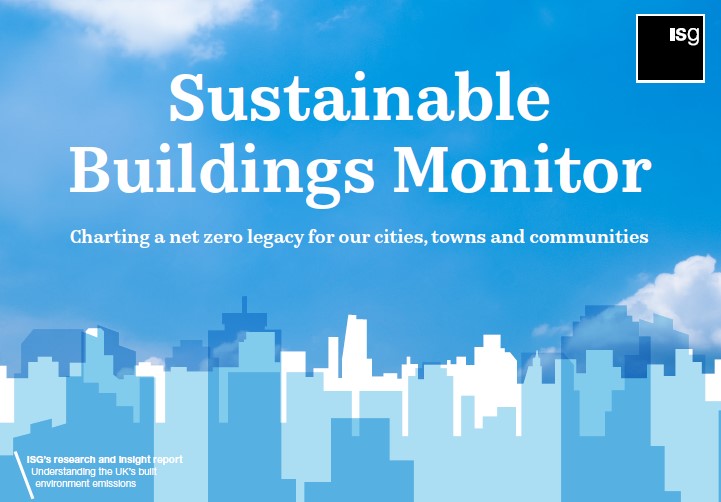Sustainable Buildings Monitor
Contents |
[edit] Introduction
In May 2021, the construction services company ISG published the Sustainable Buildings Monitor. The report examines the range of carbon emissions created by the operation of non-residential buildings in different regions of the UK. The research was conducted by the Centre for Economics and Business Research (CEBR) on behalf of ISG.
[edit] Findings
CEBR used publicly available information to set out regional estimates of the emissions and energy consumption of commercial buildings to assess the scale of the net-zero challenge. The report concluded that all regions have a significant distance to travel to achieve carbon neutrality by 2050.
[edit] Regional highs and lows
Analysis showed that the South West is the least energy intensive while Scotland is the most energy intensive. Scotland’s high levels of consumption were linked to its temperatures and its native industries.
Regions including London and the South-East, with a higher reliance on electricity, would perform marginally better in 2021 due to the changes in electricity carbon emission factors.
[edit] Performance factors
A significant factor in building performance is related to the maintenance regime and optimisation of building services. Data suggested that poorly performing building services account for a significant percentage of energy use and emissions production.
Also, the effect of sector clustering in preferential locations that provide commercial advantage, for example access to transport hubs, a highly skilled local workforce or abundant energy supplies also contributed to regional variances.
[edit] Innovative sectors
The report’s industry analysis highlighted how some of the UK’s most important sectors are embracing innovation. Education and healthcare were recognised for their commitments to moving towards zero carbon goals. Data centres were also acknowledged as innovators in terms of energy usage.
[edit] Standardising data
One of the most significant findings revealed an inherent challenge - the availability, timeliness, quality and inconsistency of data - highlighting the need for a uniform and transparent process for benchmarking and performance measurement. ISG sees standardised data as pivotal in the fight to reduce carbon emissions.
[edit] Related articles on Designing Buildings Wiki
- Building maintenance.
- Building services.
- Building services maintenance contractors’ role in reducing carbon emissions
- Net zero carbon 2050.
- Renewable energy.
- Scotland publishes plans to reach net zero targets with Heat in Buildings Strategy.
[edit] External resources
Featured articles and news
Apprenticeships and the responsibility we share
Perspectives from the CIOB President as National Apprentice Week comes to a close.
The first line of defence against rain, wind and snow.
Building Safety recap January, 2026
What we missed at the end of last year, and at the start of this...
National Apprenticeship Week 2026, 9-15 Feb
Shining a light on the positive impacts for businesses, their apprentices and the wider economy alike.
Applications and benefits of acoustic flooring
From commercial to retail.
From solid to sprung and ribbed to raised.
Strengthening industry collaboration in Hong Kong
Hong Kong Institute of Construction and The Chartered Institute of Building sign Memorandum of Understanding.
A detailed description from the experts at Cornish Lime.
IHBC planning for growth with corporate plan development
Grow with the Institute by volunteering and CP25 consultation.
Connecting ambition and action for designers and specifiers.
Electrical skills gap deepens as apprenticeship starts fall despite surging demand says ECA.
Built environment bodies deepen joint action on EDI
B.E.Inclusive initiative agree next phase of joint equity, diversity and inclusion (EDI) action plan.
Recognising culture as key to sustainable economic growth
Creative UK Provocation paper: Culture as Growth Infrastructure.
Futurebuild and UK Construction Week London Unite
Creating the UK’s Built Environment Super Event and over 25 other key partnerships.
Welsh and Scottish 2026 elections
Manifestos for the built environment for upcoming same May day elections.
Advancing BIM education with a competency framework
“We don’t need people who can just draw in 3D. We need people who can think in data.”






















